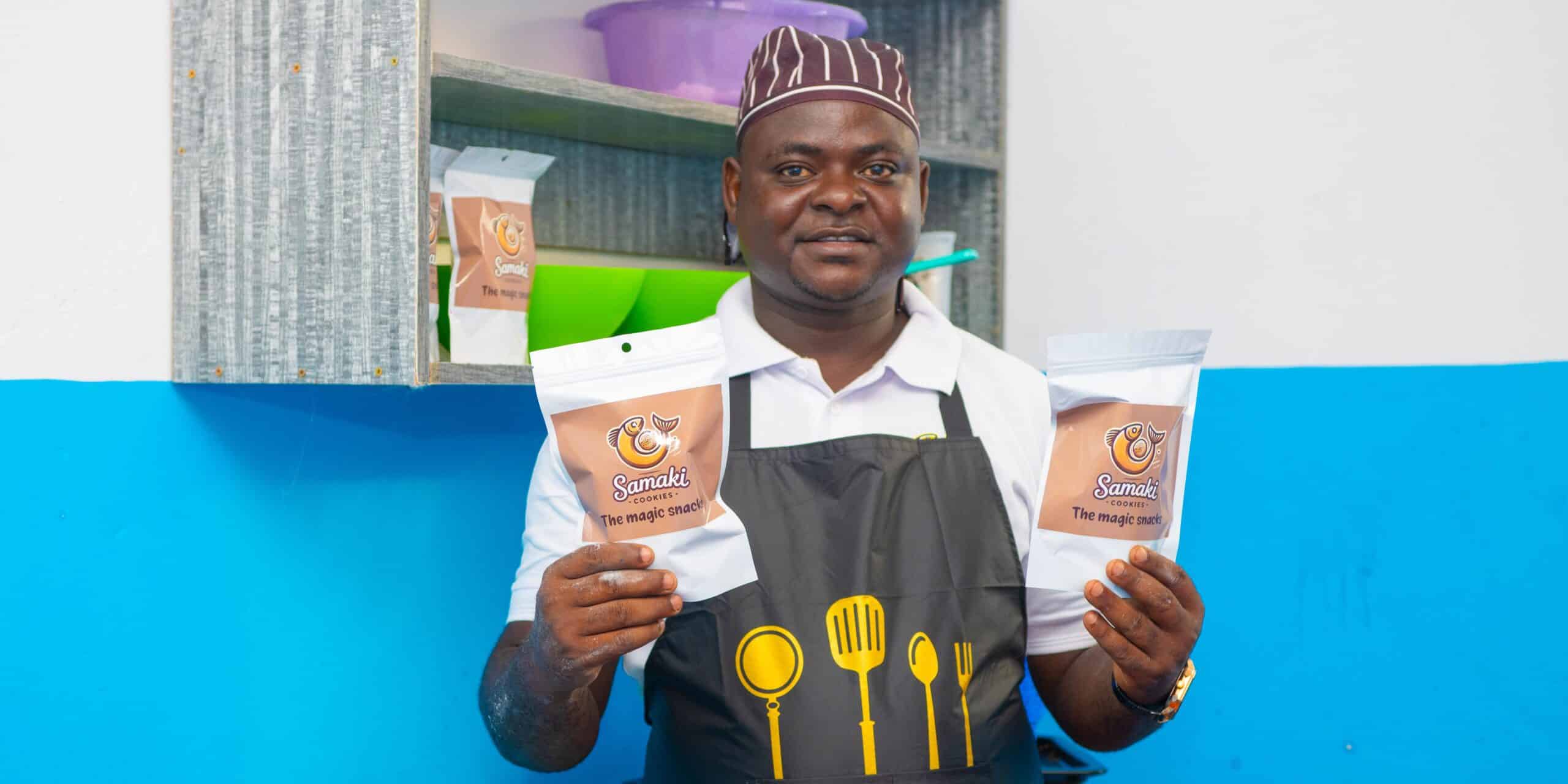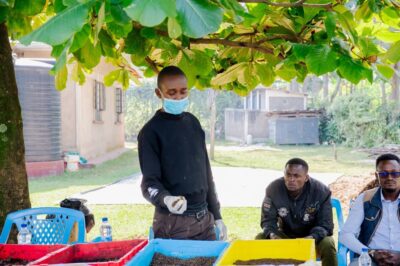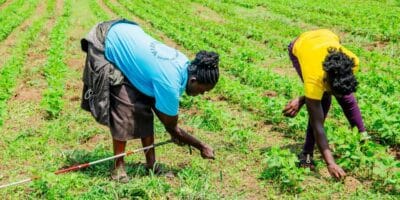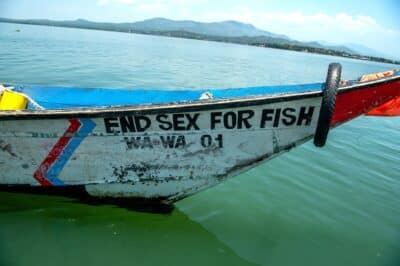Stories
Kenya
7 May 2025
Fish cookies: an unexpectedly tasty treat

Fish cookie anyone?
By perfecting a cookie recipe fortified with fish protein, entrepreneur Frank Thoya is tackling malnutrition among snack-loving children in Kenya.
When COVID-19 struck in 2020, it disrupted livelihoods across the globe, leaving many without jobs due to strict measures aimed at curbing the spread of the virus.
Among those affected was Frank Thoya, an event planner whose career came to a standstill when public gatherings were banned to reduce the spread of the virus.
With his primary source of income gone, Thoya was forced to find a new path forward in generating income.
‘At first, people would ask about the smell, assuming it had the strong odour of preserved fish.’
Frank Thoya
inventor of Samaki Cookies and owner of SeaBerry Snacks
While exploring possibilities, he became aware of the issue of malnutrition in his coastal county. He also observed the persistent requests of children for snacks. “That was the turning point – where I started thinking about Samaki Cookies” he says. Samaki is the Swahili word for ‘fish’.
“It was all about solving a problem,” he states, “The question I asked myself was, could fish-based snacks be a good nutritional solution for malnourished children?”
Production of Samaki Cookies
‘Samaki Cookies’ are snacks made of a combination of fish, cassava flour, cashew nut, groundnut, coconut, milk and sugar.
Lacking any formal baking knowledge, Thoya spent nearly two years experimenting through trial and error before perfecting his recipe.
“I never attended baking school, but I challenged myself. Initially, I believed wheat was the only flour suitable for baking,” he recalls.

However, realising that wheat is not commonly grown in the coastal region, he turned to cassava—one of the locally available ingredients. His first attempt at baking Samaki Cookies with cassava flour, however, was far from successful.
“The result was funny—I didn’t like it at all,” he admitted.
Determined to improve, Thoya sought guidance from various sources, including a hotel chef. Despite numerous attempts, the results remained unsatisfactory until February 2023, when he finally got the formula right.
‘Just like Coca-Cola has its secret formula for making drinks, we now have our formula for making Samaki Cookies.’
Frank Thoya
inventor of Samaki Cookies and owner of SeaBerry Snacks
“I vividly remember the day we perfected it. Just like Coca-Cola has its secret formula for making drinks, we now have our formula for making Samaki Cookies,” he recalls.
At that point, Thoya thought his challenges were over—only to face a new hurdle: community perception of the snack.
“At first, people would ask about the smell, assuming it had the strong odor of preserved fish,” he recalls. “However, I assured them that the snack had no fishy smell at all.”

Despite initial skepticism, Samaki Cookies gradually gained acceptance, especially among expectant women and children.
“It turned out to be something that people needed. We had them taste it, and they loved it, especially pregnant women and children,” he noted.
Joining the YISA programme
Thoya first learnt about Farm Africa’s Youth in Sustainable Aquaculture (YISA) programme through the YISA Facebook page. His growing reputation in the fish value chain led a friend to invite him to a meeting.
Here Thoya learned about the YISA programme’s goal to create 150,000 jobs for young people in Kenya’s aquaculture sector. The programme is being implemented by the Mastercard Foundation, in partnership with Farm Africa and a consortium of partners—including Echo Network Africa, Lattice, Aquarech, Ramogi Institute of Advanced Technology, Hydro Victoria, and Livingwood Consultants Ltd.
During the meeting, Thoya had the opportunity to pitch his idea to fish producers, highlighting how his venture could benefit their businesses.
“My argument was simple—if all these farmers produce fish, who will buy it? The market becomes saturated,” he explains. “Samaki Cookies offers a sustainable solution by purchasing their fish, ensuring they have a reliable buyer,” he states.
The impact of the YISA programme
Thoya’s introduction to YISA was a timely one. He had been operating from home but his oven had been stolen, bringing his production to a standstill. This setback had forced him to shut down while he searched for a way to revive his business, which he had named SeaBerry Snacks.
‘The YISA programme has elevated my business to the point where it has been featured by 17 media houses across Africa.’
Frank Thoya
inventor of Samaki Cookies and owner of Seaberry Snacks
“After engaging with the YISA programme, you can see the progress. They have played a significant role in my growth, even helping me secure a certification sticker from the Kenya Bureau of Standards (KEBS)—a stamp of approval that ensures our cookies are fit for human consumption and can be sold in major supermarkets worldwide. That’s a major milestone for us, something we never envisioned before,” says Thoya.
The programme has also increased his business visibility. “The YISA programme has elevated my business to the point where it has been featured by 17 media houses across Africa – an opportunity I wouldn’t have had without YISA’s support,” he adds.
Beyond financial support, Thoya credits his success to the business development services provided during YISA’s training and business incubation.
“The process was seamless, and the expertise provided was invaluable. The business development curriculum in YISA is a game-changer, you see your business plan on paper and then implement it step by step,” he notes.
He further lauds YISA’s approach to empowering young entrepreneurs: “One thing I love about YISA is that they don’t just train and walk away. They equip you with the necessary tools to apply what you’ve learnt. The machines you see here today are a result of their support.”
Creation of jobs through Samaki Cookies
Thoya’s business has created at least six direct jobs for young people in the area and several other indirect jobs for young women and men who supply ingredients for making Samaki Cookies.
“Right now, we have six employees working in sales and marketing, riders delivering snacks to customers, and two chefs responsible for baking the cookies,” shares Thoya.
Beyond direct employment, the business has also created opportunities for local suppliers: “We have also generated indirect jobs for those providing us with essential ingredients—fishermen supplying fish, and women supplying cassava, cashew nuts, coconuts and groundnuts.”
Looking ahead, Thoya envisions opening a fully-fledged factory in the next two years to expand job opportunities for young women and men in Kilifi County.
“Our goal is to establish a fully operational factory for Samaki Cookies, complete with cold rooms for fish preservation and large-scale bakery equipment. This will enable us to create more job opportunities for young women and men, thus ensuring YISA’s mission is fully realised.”




